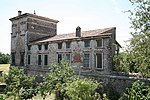Veronella
Cities and towns in VenetoMunicipalities of the Province of VeronaVeneto geography stubs
Veronella is a comune (municipality) in the Province of Verona in the Italian region Veneto, located about 80 kilometres (50 mi) west of Venice and about 30 kilometres (19 mi) southeast of Verona. As of 31 December 2004, it had a population of 3,946 and an area of 20.8 square kilometres (8.0 sq mi).The municipality of Veronella contains the frazione (subdivision) San Gregorio. Veronella borders the following municipalities: Albaredo d'Adige, Arcole, Belfiore, Bonavigo, Cologna Veneta, Minerbe, Pressana, and Zimella.
Excerpt from the Wikipedia article Veronella (License: CC BY-SA 3.0, Authors).Veronella
Zum Horst, Kusel-Altenglan
Geographical coordinates (GPS) Address Nearby Places Show on map
Geographical coordinates (GPS)
| Latitude | Longitude |
|---|---|
| N 45.316666666667 ° | E 11.333333333333 ° |
Address
Zum Horst
Zum Horst
66885 Kusel-Altenglan, Patersbach
Rheinland-Pfalz, Deutschland
Open on Google Maps








